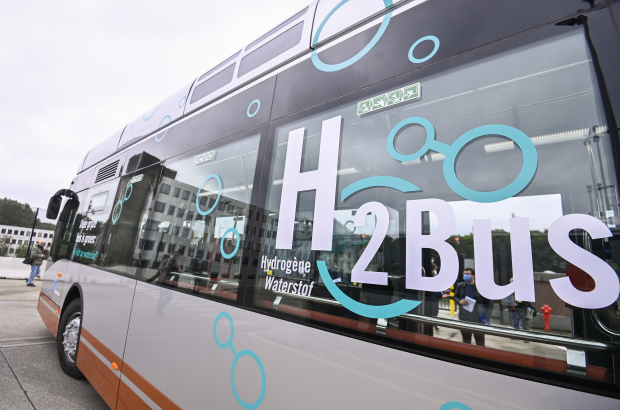- Daily & Weekly newsletters
- Buy & download The Bulletin
- Comment on our articles
Stib to roll out first hydrogen-powered bus in September
Brussels public transport operator Stib presented its first hydrogen-powered bus on Monday at the Marly depot in Neder-over-Heembeek. After carrying out a series of tests without passengers in recent weeks, it will put the new bus into circulation on its network at the start of September.
"Stib's fleet has been transformed," said regional mobility minister Elke Van den Brandt. "In addition to the 37 new electric buses that are currently running on the network and the adaptation of depots with recharging stations, the company is now launching a hydrogen bus in a bid to always be at the forefront of green technologies." The minister also highlighted the benefits the bus would bring to the inhabitants of Brussels, in terms of air quality and noise reduction.
"We want to offer transport that is as clean as possible," she added. "That's why we need to continue to focus on multiple technologies. There is no single miracle solution."
The hydrogen bus, leased from the Belgian firm Van Hool for an initial two-year period, was delivered at the beginning of July. Various tests were carried out in the city during the summer. Some 15 volunteer drivers and a handful of technicians from the Marly depot were also trained in its use and in the safety regulations specific to the use of a gas such as hydrogen. Stib will get its supply of hydrogen from a site in Zaventem with a view to having a mobile station from Eoly Energy installed at the Marly depot in early 2022.
The technology that powers the bus is based on the principle of water electrolysis. Electricity separates oxygen (O2) and hydrogen (H) from water (H-2O). The hydrogen is recovered and stored under pressure in a tank. In the bus, it is then recombined with oxygen from the ambient air in a fuel cell, which makes it possible to generate electricity again, without releasing polluting emissions.
Travelling 300 to 500km on 40kg of hydrogen, the range of the bus is double that of an electric bus. Filling the hydrogen reserve takes only a few minutes, which is another advantage.
The bus will be tested on several lines throughout Brussels, in order to be able to observe its use in different traffic conditions. This evaluation phase will last two years.
"The test will allow us to learn more, both with regard to the vehicle itself and its supply, and the day-to-day management," explained Stib chief executive Brieuc de Meeûs. "In this way, we will be able to determine whether hydrogen can be an option for running the buses of tomorrow."

















